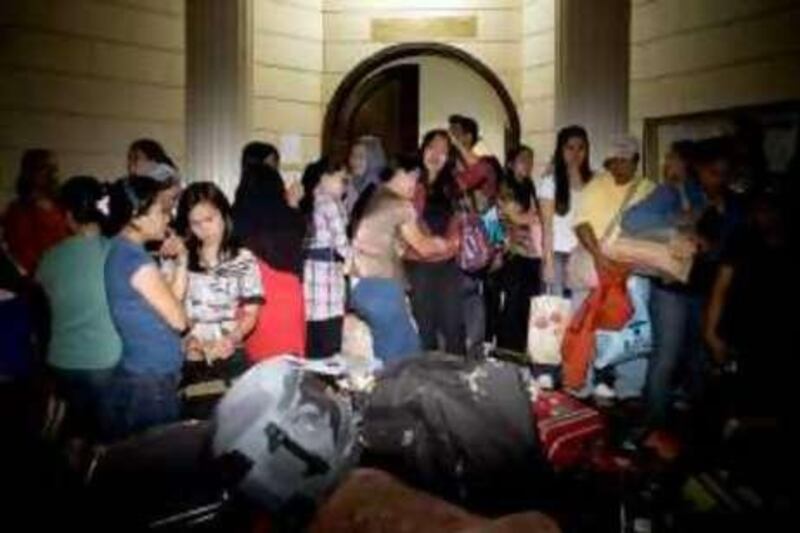MANILA // The UAE is the third-most popular destination for Filipino workers after the United States and Saudi Arabia but every year thousands are being exploited by unscrupulous recruitment agencies, a report commissioned by the International Labour Organisation has claimed. Private recruitment agencies in the UAE and Philippines manage most of the 200,000 Filipinos who head to the Emirates each year to work.
"While the recruitment agencies provide critical services such as logistical support and information about visa policies, living and working conditions, some abuse their clients by charging exorbitant fees or violating basic human rights," the report said. Released by the Washington-based Migration Policy Institute (MPI) on June 3, the report, Migration Middlemen, examined the role of recruitment agencies in the Philippines and UAE.
The nonprofit, nonpartisan think tank, which studies the movement of people around the world, said in its report that the practices of recruitment agencies as well as their regulation in the UAE and the Philippines needed "significant improvement". The repatriation of some 600 Filipino domestic workers from the Middle East, including the UAE, in April highlighted the need to re-examine regulatory standards and in particular recruitment agencies.
Women interviewed by The National at the time spoke of recruitment agencies in the Philippines promising them work in sectors such as the hospitality industry but when they arrived they were employed as domestics, often in difficult conditions. Gold Roma, the director of the policy planning and research division of the Commission on Filipinos Overseas, said yesterday: "We are aware of the problem and we are taking steps to stop the practice, but illegal recruiters are often one step ahead of the government."
In March the Philippines amended the Migrant Worker and Overseas Filipino Act, giving overseas workers greater protection and imposing harsh penalties for illegal recruiters. "One provision of the amended act is to make it illegal for 'job reprocessing' - that is offering someone a specific job only to give them something else when they arrive," Ms Roma said. The amended law provides a penalty of imprisonment of from 12 to 20 years and a fine of between one million and two million pesos (Dh79,560 to Dh159,000) for violators.
Ms Roma said that as far as she was aware, some 600 individuals in the Philippines were charged last year with illegal recruitment - of which 130 are either before the courts or about to go to court. She said the governments of the UAE and the Philippines have worked closely over the past year to improve the conditions of overseas workers. But she admitted a lot of Filipinos choose not to go through the normal channels to look for work overseas.
According to Philippines government data for 2008, which are the latest figures, there were 653,609 undocumented Filipino workers worldwide, of which 32,000 were in the UAE. "It's difficult to track these people if they don't go through the legal channels," Ms Roma said. "Illegal recruitment is big business. Every time we close a loophole they [illegal recruiters] have found a way around it." Although both countries' governments have been regulating recruitment agencies and their operations for nearly three decades, there is still a "policy mismatch between the two regulatory systems", the report said.
"Coupled with difficulties in enforcing regulations this has led to inadequate protection for migrant workers as well as a continuing flow of unauthorized workers," the report's author, the MPI policy analyst Dovelyn Agunias, said. This has resulted in a three-tier labour migration system for the nearly 600,000 Filipinos working in the UAE. At the top is a well documented and organised labour migration policy based on written contracts following strict regulatory guidelines set in both countries, she said.
"Then there is a labour flow based on shifting arrangements that typically result in lower wages, a different job, and reduced benefits compared to those originally promised to migrant workers by recruiters," she said. "At the bottom is an unregulated, unauthorised flow of workers who bypass the recruitment system altogether and migrate to the United Arab Emirates with a visitor visa." kwilson@thenational.ae





